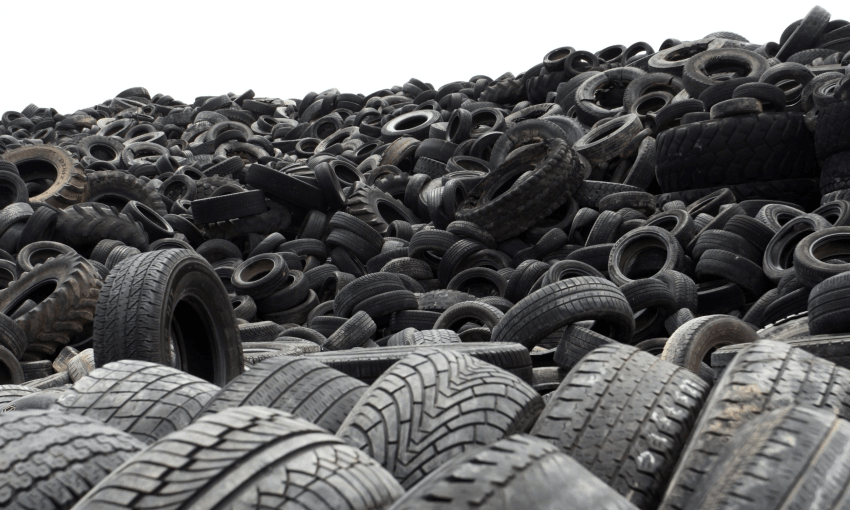Lithium-ion batteries are magnificent feats of engineering and vital for renewable energy. But if we’re not careful with them, they’ll create enormous environmental problems, writes Vector Senior Sustainability Advisor Juhi Shareef.
Have you ever seen huge piles of tyres in New Zealand? I have. There are thousands of them throughout our country, and that’s mostly because they’re so difficult to re-use and recycle cleanly. They remind me of those apocalyptic scenes in books and movies (hello, Mad Max Fury Road!), and present some sinister environmental risks.
When exposed to water, they leach a toxic mix of cadmium, lead and zinc, and when they catch fire then those plumes of black smoke release particulates and carcinogens into the atmosphere. In fact, New Zealand’s used tyre problem has become so bad we’re appealing to the government to step in and do something. Thankfully the tyre industry has been working together on the Tyrewise initiative.
But in less time than you think, those tyre piles could soon be eclipsed by mountains of used lithium-ion batteries instead.
Those suckers are in everything, from your kids’ toys to your phone to your power tools. They are also the most common batteries in electric vehicles.
Lithium-ion batteries are key for our energy future and while some might think there’s nothing to worry about, there are complications when it comes to recycling them.
The difficulties of recycling batteries
When it comes to recycling lithium-ion batteries, a big safety hazard is that if they are punctured or mistakenly crushed, they can catch fire. This can cause major headaches for waste companies here in New Zealand, or for anyone wanting to ship used batteries out of the country.
The business case for recycling them could also be facing diminishing returns. because the quality of the raw materials extracted can degrade with each round of processing, and because there are fewer high value materials worth extracting thanks to manufacturers wanting to reduce the cost of production.
It’s also not clear if there’s enough global capacity, or even appetite, for recycling lithium-ion batteries. A new facility has just been announced for New York State, and Tesla batteries can be shipped to their Gigafactory for pre-processing, but will other countries be willing to take our waste in 30 years’ time? China’s National Sword Policy means it has stopped taking our poor-quality plastic waste, and it’s very possible the scope will increase to other end of life materials.
In New Zealand, we face a bit of a chicken and egg situation. Some recyclers would like to invest in pre-processing machinery but don’t know the scale of the demand. Meanwhile local businesses don’t know that the machinery is on its way here, so they haven’t put their hands up to express their interest. It’s hard to predict what numbers to expect.
When dead batteries become something more
With recycling a lithium-ion battery being tricky, it makes sense to get the most value out of it as you can before it’s dumped as trash.
For electric vehicle batteries in particular, when it no longer has the capability to provide enough energy to shift a car, it still typically has about 80% battery capacity left. So it makes sense to repurpose them and give them a second life where possible – and there are great examples of that happening all over the world.
An Australian start-up, Relectrify, is designing control systems that could turn a used car battery into home or grid-level energy storage units. BMW is doingsomething similar. Nissan’s used batteries are given a second life in ‘Reborn’ street lights for areas that don’t have access to electricity, and their new and used Leaf batteries support the 4,200 solar panels at the Johan Cruijff Arena in Amsterdam.
Closer to home, here at Vector we’re looking into whether repurposed EV batteries can be used to provide a ‘mobile’ power source similar to diesel generators. We’re also interested in using batteries to help manage peak loads on our electricity grid – whether that’s through massive grid-tied ones, residential ones, orborrowing the power stored in EVs.
To help bring that vision for a new energy future to life, Vector has brought together a Battery Leaders Group (where do I sign up, right!?) which includes companies like Audi, BMW, Toyota, The Scrap Metal Recycling Association of NZ and Waste Management.
We’ve come together as a group of businesses with vested interests in batteries who also happen to share common sustainability challenges. We hope that by working together now, we can find ways to retain already-extracted valuable metals and raw materials for as long as possible, rather than returning them to the ground – or piling them up like tyres.
Juhi is the Senior Sustainability Advisor at Vector. She works with business partners to create plans and processes to help make technologies now being used in the energy sector more sustainable. Part of that has included convening a Battery Leaders Group, which develops rules and guidelines to ensure re-use and recycling for large lithium-ion batteries throughout the industry. Her next mission: solar panels.
This content is brought to you by Vector. If you live in Auckland, they also delivered the power you’re using to read it. And they’re creating a new energy future for all of us, as showcased by the incredible Vector Lights in partnership with Auckland Council.
